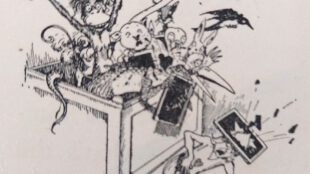Fictional Juries
(Image Source) (Quote Source) Briefly in the American colonies, there was relief from the legal profession. Contemporaneous records capture the excitement; “They have no lawyers… ‘Tis a happy country”. Laymen effectively resolved community disputes, having long resented the special privileges, principles, and esoteric language of English lawyers. However, as the complexity of colonial society increased, lawyers were, in the end, a necessary evil. The lay public was again captured into juries to conceal the defects of the judicial system. Juries as Finder of Fact and Law In ancient Athens, juries functioned as a democratic countermeasure to the wealthy and powerful elites. Too numerous to bribe and too poor to be partial to the upper class, hundreds of jurors were drawn from the lower classes for a single trial. A lack of selection or exclusion mechanisms prevented the elite from constructing a more favorable jury. Laws were vague and largely inconsistent, leaving the jury to both determine the facts and apply the law. Trials were confined to one day of litigants arguing their narratives with nearly any evidence permitted; wailing mothers and infants, family reputations, and military service, all influenced the verdict. Athenian juries were an incorruptible democratic force, [read more]

